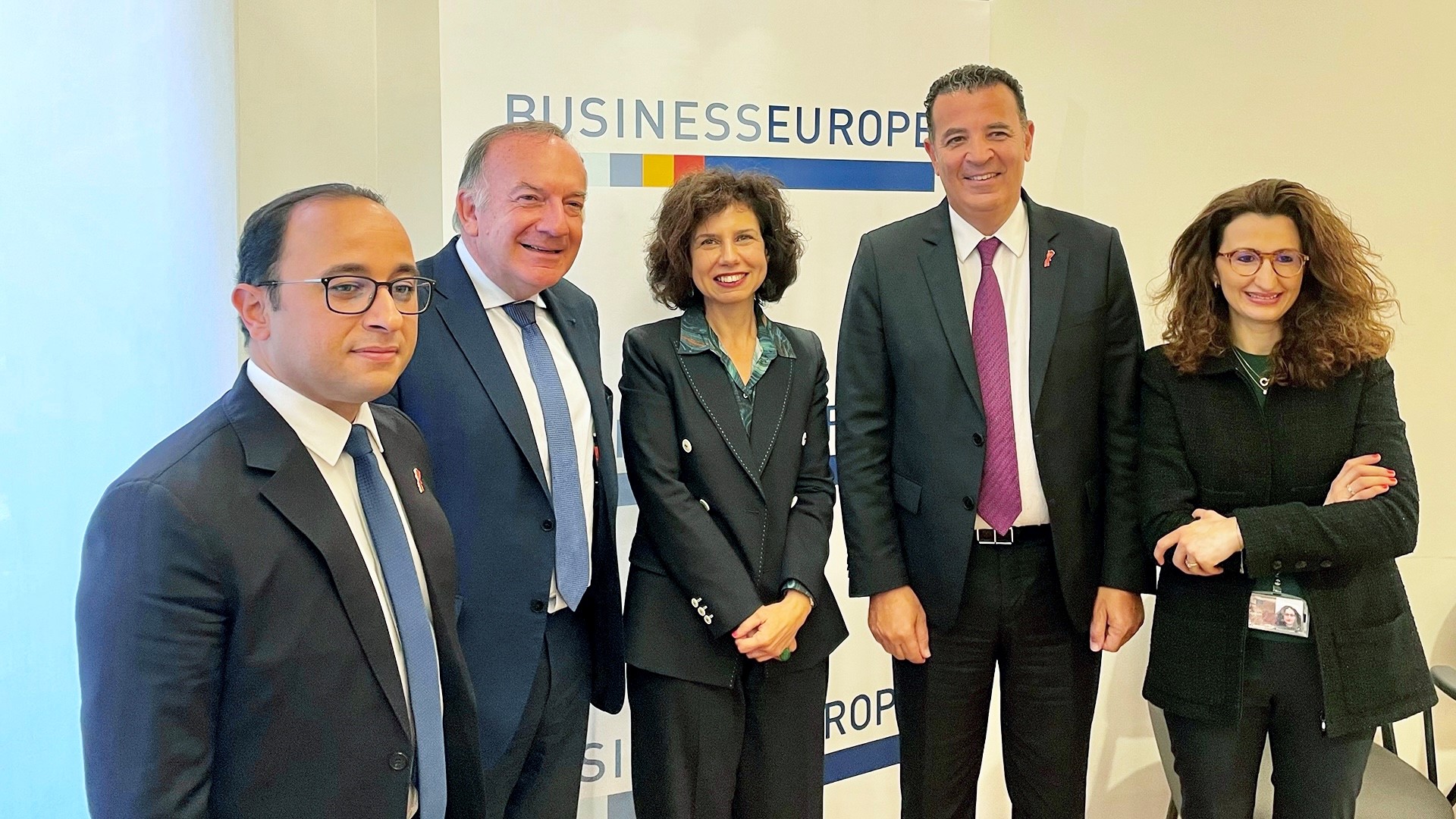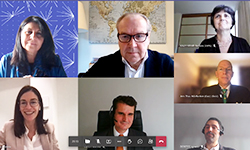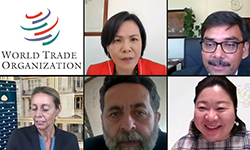BusinessEurope Headlines No. 2021-29
European and Moroccan business agree to increase cooperation

“After a long impasse, it is time to modernise the EU-Morocco association agreement. The business communities in the EU and Morocco are united in calling governments to re-engage and move the process forward”, said Pierre Gattaz, President of BusinessEurope, during a meeting with the President of the Moroccan business federation CGEM, Chakib Alj. During their exchange, the two organisations discussed EU-Morocco relations and agreed to cooperate more closely to deepen the economic ties between their regions. The meeting took place at a challenging time for EU-Morocco relations as the Court of Justice of the EU had struck down two agreements covering their agri-food and fisheries trade on 29 September. “I am confident that the EU and Morocco will overcome the current challenges and work together to modernise the framework governing our economic relations, which is key for jobs and prosperity in both regions”, President Gattaz declared. In the week ahead of their meeting, BusinessEurope and CGEM had adopted a joint declaration calling for the modernisation of the EU-Morocco Association Agreement, which dates from 2000.
![]() Contact: Benedikt Wiedenhofer
Contact: Benedikt Wiedenhofer
Morning Talks on International Issues
Once a month Deputy Director General Luisa Santos will be interviewing a special guest to discuss hot topics on international affairs. Emma Marcegaglia, chair of the Business 20 (B20) Italy, will be the first one, on 14 October. Don’t miss the discussion! Register here.
How trade policy can support business in a challenging environment
 “Trade policy can support businesses adapting to a changing and challenging global environment by leveraging opportunities and mitigating challenges for European companies and their competitiveness”, said Luisa Santos, Deputy Director General of BusinessEurope, during the meeting of the European Council Group on Trade Questions on 5 October. For instance, the International Procurement Instrument, once adopted, can be a good tool to open more opportunities for European companies in third countries’ public procurement markets. Trade policy, she added, can also support companies in their efforts to adjust to the digital and green transformations. “For instance, by addressing data localisation requirements or forced technology transfers and by using a mix of tools to convince trading partners to do more in the area of sustainability, including bilateral trade agreements or the GSP-General System of Preferences”, Santos highlighted.
“Trade policy can support businesses adapting to a changing and challenging global environment by leveraging opportunities and mitigating challenges for European companies and their competitiveness”, said Luisa Santos, Deputy Director General of BusinessEurope, during the meeting of the European Council Group on Trade Questions on 5 October. For instance, the International Procurement Instrument, once adopted, can be a good tool to open more opportunities for European companies in third countries’ public procurement markets. Trade policy, she added, can also support companies in their efforts to adjust to the digital and green transformations. “For instance, by addressing data localisation requirements or forced technology transfers and by using a mix of tools to convince trading partners to do more in the area of sustainability, including bilateral trade agreements or the GSP-General System of Preferences”, Santos highlighted.
Contact: Luisa Santos
Employers for reforms: Way ahead on active labour market policies
 Accompanying structural changes and engaging in the necessary reforms to support job creation, employment participation and labour market mobility were the key topics for discussion during the joint online webinar “Supporting recovery: Effective job-to-job transitions”, co-organised by BusinessEurope and the European Economic and Social Committee (EESC) Employers’ Group on 1 October. Employment is crucial for our economies and societies. Human skills are essential for companies to be successful. Employment also provides incomes, interaction and recognition to people. And higher employment participation is crucial to sustain social systems in the face of demographic ageing. The post-Covid recovery is a time of profound change: on-going restructuring processes are accelerated by the digital and green transitions. Enterprises and workers need to adapt to these changing conditions. Amongst the most urgent challenges is to address growing labour and skills shortages. Better cooperation between public and private employment services will be crucial to increase employment in the coming years, along with efforts to strengthen incentives for inactive people to work. Regular dialogue between social partners and policy-makers is also essential to grasp the nature of changes and put forward the relevant policies and measures, in line with changing economic and social conditions. These were the main messages of Maxime Cerutti, Social Affairs Director, BusinessEurope during the event.
Accompanying structural changes and engaging in the necessary reforms to support job creation, employment participation and labour market mobility were the key topics for discussion during the joint online webinar “Supporting recovery: Effective job-to-job transitions”, co-organised by BusinessEurope and the European Economic and Social Committee (EESC) Employers’ Group on 1 October. Employment is crucial for our economies and societies. Human skills are essential for companies to be successful. Employment also provides incomes, interaction and recognition to people. And higher employment participation is crucial to sustain social systems in the face of demographic ageing. The post-Covid recovery is a time of profound change: on-going restructuring processes are accelerated by the digital and green transitions. Enterprises and workers need to adapt to these changing conditions. Amongst the most urgent challenges is to address growing labour and skills shortages. Better cooperation between public and private employment services will be crucial to increase employment in the coming years, along with efforts to strengthen incentives for inactive people to work. Regular dialogue between social partners and policy-makers is also essential to grasp the nature of changes and put forward the relevant policies and measures, in line with changing economic and social conditions. These were the main messages of Maxime Cerutti, Social Affairs Director, BusinessEurope during the event.
![]() Contact: Anna Kwiatkiewicz-Mory
Contact: Anna Kwiatkiewicz-Mory
CBAM discussed with the appliances industry
 In order to be effective, the Carbon Border Adjustment Mechanism (CBAM) has to take the realities of carbon leakage into account – and pay close attention to cost effects for European producers dependent on basic materials. This was BusinessEurope’s central message at a panel organized by APPLiA Europe, the association of European home appliance manufacturers on 30 September. Informed by first discussions with members, BusinessEurope, represented by Adviser Steffen Engling, underlined the importance of the continued use of free allocation of allowances to create a truly level playing field. The discussion was enriched by the contributions from Electrolux, the European Environmental Bureau and the American Association of Home Appliance Manufacturers (AHAM), adding an outsider’s view to the debate. Participants agreed that a careful implementation of any CBAM measure was crucial, as there is a real risk of unintended consequences that might actually increase the risk of carbon leakage. Watch the recording of the event and read the main takeaways.
In order to be effective, the Carbon Border Adjustment Mechanism (CBAM) has to take the realities of carbon leakage into account – and pay close attention to cost effects for European producers dependent on basic materials. This was BusinessEurope’s central message at a panel organized by APPLiA Europe, the association of European home appliance manufacturers on 30 September. Informed by first discussions with members, BusinessEurope, represented by Adviser Steffen Engling, underlined the importance of the continued use of free allocation of allowances to create a truly level playing field. The discussion was enriched by the contributions from Electrolux, the European Environmental Bureau and the American Association of Home Appliance Manufacturers (AHAM), adding an outsider’s view to the debate. Participants agreed that a careful implementation of any CBAM measure was crucial, as there is a real risk of unintended consequences that might actually increase the risk of carbon leakage. Watch the recording of the event and read the main takeaways.
Contact: Steffen Engling
How to restore a WTO that matters
 BusinessEurope organised a working session on “Strengthening global trade rules to restore a WTO that matters”, at the World Trade Organisation (WTO) Public Forum on 1 October. The discussion focused on the current challenges that the WTO faces and the importance of creating new rules and strengthening existing ones where needed. It showed that divergences remain on how different WTO members and stakeholders see key issues such as competitive neutrality, how to tackle subsides, special and differential treatment, plurilateral agreements and others. While it will be difficult to bridge those differences, the speakers agreed that the stakes for the WTO are high and that, unless members are able to achieve tangible results at the upcoming 12th Ministerial Conference (from 30 November to 3 December), the blow to the multilateral trading system and the WTO will be severe. The working session had the participation of Brajendra Navnit, Ambassador and Permanent Representative of India to the WTO; LI Yihong, Minister, Deputy Permanent Representative of the Peoples’ Republic of China to the WTO; Ignacio Garcia Bercero, Director for Multialteral Affairs, Strategy, Analysis, Evaluation, Directorate General for Trade, European Commission; Teruko Wada, Director, International Affairs Bureau, Keidanren; and Stormy-Annika Milder, Executive Director of the Aspen Institute Germany (moderator). Watch the recording of the working session.
BusinessEurope organised a working session on “Strengthening global trade rules to restore a WTO that matters”, at the World Trade Organisation (WTO) Public Forum on 1 October. The discussion focused on the current challenges that the WTO faces and the importance of creating new rules and strengthening existing ones where needed. It showed that divergences remain on how different WTO members and stakeholders see key issues such as competitive neutrality, how to tackle subsides, special and differential treatment, plurilateral agreements and others. While it will be difficult to bridge those differences, the speakers agreed that the stakes for the WTO are high and that, unless members are able to achieve tangible results at the upcoming 12th Ministerial Conference (from 30 November to 3 December), the blow to the multilateral trading system and the WTO will be severe. The working session had the participation of Brajendra Navnit, Ambassador and Permanent Representative of India to the WTO; LI Yihong, Minister, Deputy Permanent Representative of the Peoples’ Republic of China to the WTO; Ignacio Garcia Bercero, Director for Multialteral Affairs, Strategy, Analysis, Evaluation, Directorate General for Trade, European Commission; Teruko Wada, Director, International Affairs Bureau, Keidanren; and Stormy-Annika Milder, Executive Director of the Aspen Institute Germany (moderator). Watch the recording of the working session.
Contact: Elena Suárez or Sofia Bournou
Calendar 
- 14 October: Morning Talks on International Issues No.1
- 20-22 October: European Forum for New Ideas 2021
- 23 October: 5th EU-GCC Business Forum
- 25-29 October: EU Sustainable Energy Week
- 31 October - 12 November: United Nations Climate Change Conference (COP26)
Not yet a subscriber? Register here.
Reminder: please have a look at our privacy policy